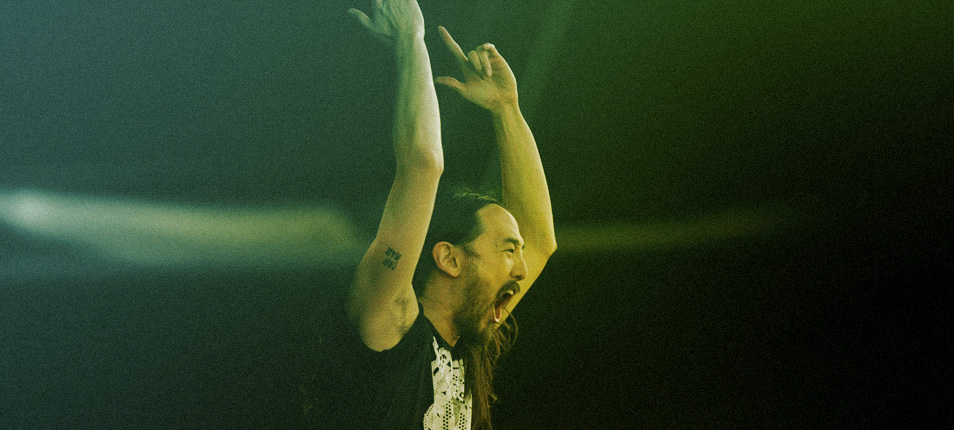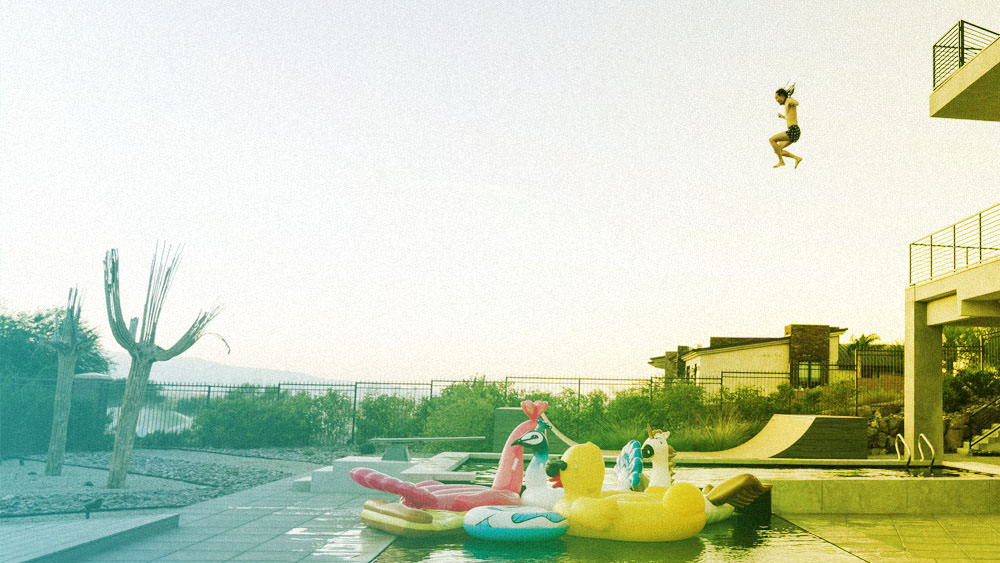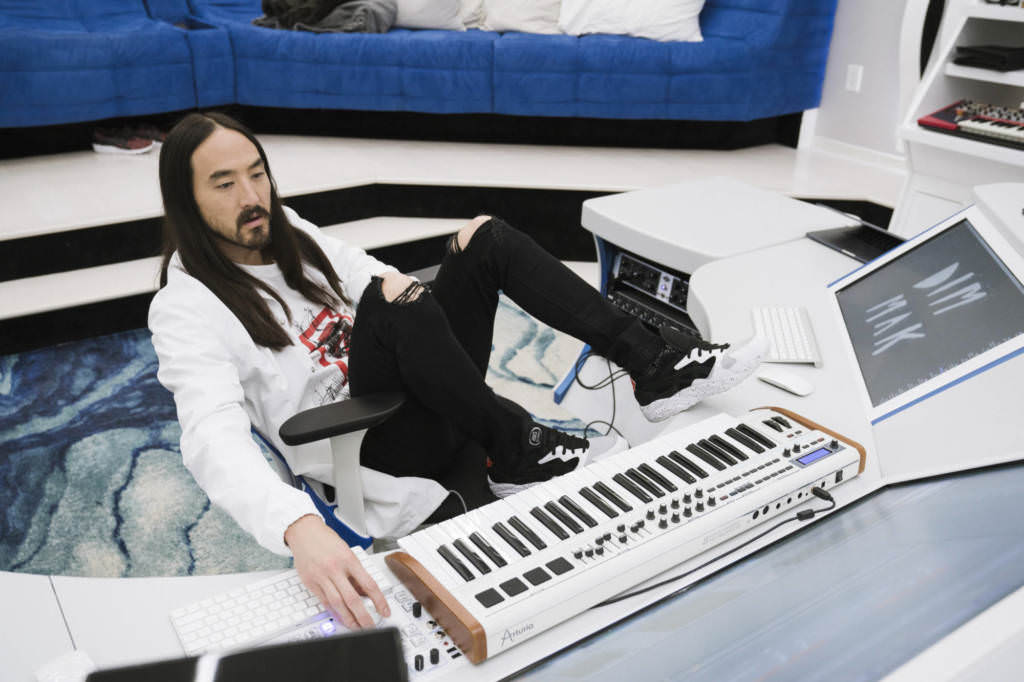Steve Aoki is no stranger to building brands.
His father Hiroaki Aoki is the founder of teppan chain Benihana, and as an understudy to the family business, Aoki learned the struggles of building a marque that resonates with the public firsthand with his own projects—beginning with Dim Mak, the record label he launched in his early twenties.
Steve’s career and personal brand didn’t officially take off until he worked his way toward becoming a globally recognized producer over the last decade. Now, the 39-year-old is one of the most active musicians on the planet dabbling in plenty of projects outside of making energetic synths.
His style for building a brand is simple, he says. All he has to do is sprinkle a strand of his DNA into it.
Earlier this year, the electro-entrepreneur launched the skater-inspired fashion line Dim Mak Collection to complement his record label. His portfolio also includes the esports Overwatch team Rogue, a skill-based video game gambling machine, a branded boot camp, and just last month, the launch of a brand ambassadorship with athletic apparel company Asics.
In an interview with AListDaily, the world’s most-travelled musician says he draws inspiration from the people around him to bring his own blend of energy to the personal and external brands that he maintains.
“One thing that carries you through and keeps you persistent—and most importantly consistent with your brand—is that you really believe in what you’re doing. Always be authentic to what you know and love,” Aoki said. “The great part about me traveling around the world is that I’m constantly influenced by all of the interesting people from different cultures that I meet—most importantly being a sponge and a student of life. I get to combine that spirit and build ideas with the teams I work with.”
Building a brand for Aoki means being able to bring his spirited persona and colorful vision to the forefront. It’s largely the reason the self-professed fitness fanatic became the central voice of Asics’ largest marketing revamp in the last quarter century, weighing in on the brand’s line of products, all while spotlighting his personal journey along the way. Owner of over a 400-pair, $100,000 shoe collection, the sneakerhead was also tapped to design his own line of Asics kicks as well.
“The world of athletics is something that’s actually a big part of my lifestyle, but now I have a platform to bring it out to the athletic world and do some exciting stuff,” Aoki said. “Whenever I get involved with partnerships, the first thing that I want to do is bring my creative energy to the table. I want to do what I’m good at by putting some of that Aoki DNA to the brand. I like to build bridges and have that common thread between all of the music, fashion and lifestyle worlds that I love so dearly and am involved in—and bring it all together.”

“I want to do what I’m good at by putting some of that Aoki DNA to the brand. I like to build bridges and have that common thread between all of the music, fashion and lifestyle worlds that I love so dearly and am involved in—and bring it all together.” —Steve Aoki
The two-time Grammy-nominated producer said that when a celebrity is designated to bring creative direction to a brand, they should never be constrained or limited to just slapping their name to Instagram posts. He instead prefers to be in the trenches offering direction and input on mood boards with creatives. When asked what the most important business lesson he’s learned as a brand owner and marketer, Aoki said that it all starts from oneself.
“First and foremost, you have to really believe in what you do,” Aoki said. “If you don’t believe in what you’re doing, you’re going to stop halfway and say, ‘I’m out!’ Everyone is watching you. If you’re leading a brand, people are going to be a part of that community. If you’re inauthentic, then they’re out too, and the community just dissolves.”
Aoki merged his entrepreneurial spirit and enthusiasm for community and gaming last year when he invested into the esports organization Rogue, one of the world’s most accomplished Overwatch teams. Being a lifelong gamer with longtime ties to E3 and an avid streamer on Twitch, it was a natural next step.
“I definitely did my research and development and looked at the entire space. I wanted an underground team with a do-it-yourself attitude with players and managers that really believed in the sport. I got in before it was too late,” said Aoki. “Just like anything, it’s difficult to navigate the early waters. But you have to believe in the sport. When I invested, I knew the risk that I’d lose everything that I’d put in. Before anything though, you have to really love and believe everything about the culture.”
As successful as Rogue had been, they failed to secure a spot in the inaugural 12-team Overwatch League, and the players have since disbanded. The series of events left Aoki frustrated with the powers that be.
“We jumped through every loophole, and we didn’t make it. It’s disappointing, sad and makes me sick with the system that these kinds of things happen,” Aoki said. “We showed more than enough to prove our spot in the league. We fought tooth and nail all the way to the end and they still didn’t give us a seat at the table. I’m not happy about that.”
On a more positive gaming-front note for Aoki, he furthered his passion in the space by lending his likeness to the skill-based casino game Steve Aoki’s Neon Dream. The first-person, musical-endless runner game for money debuted in September and is designed to draw younger groups of people who frequent casinos. Aoki lives in Las Vegas and frequently tours the Strip as a guest DJ at top nightclubs, making him instantly recognizable among millennials.
“Disruption is definitely a big part of how I love to do branding and marketing,” said Aoki, who earlier this year released “Kolony,” his first hip-hop collaboration album. He’s also working on his own album for 2018. “Now we’re disrupting the casino floor with something new. It’s not going to change the slot machine’s industry, but it’s going to add a different level of gameplay. It’s exciting to mix both worlds.”
According to Forbes, the private-jet travelling producer eponymous for wielding cakes at crowds during shows raked in $29.5 million for over 200 performances last year.
His Netflix documentary I’ll Sleep When I’m Dead and the tattoo with the same phrase on the back of his neck is evidence that although he’s globally first known as a musician, producer and DJ, the variety of side hustles he keeps makes up the course of his entire being and DNA.
“I’m a human being drawing from a lot of inspiration. I’m all about the neon future,” Aoki said. “We only have one life, and it’s extraordinary that we’re alive and talking right now. I’m not a five-year-plan kind of guy. You just have to follow your gut feeling. I’m never going to pigeonhole myself to one thing.”


